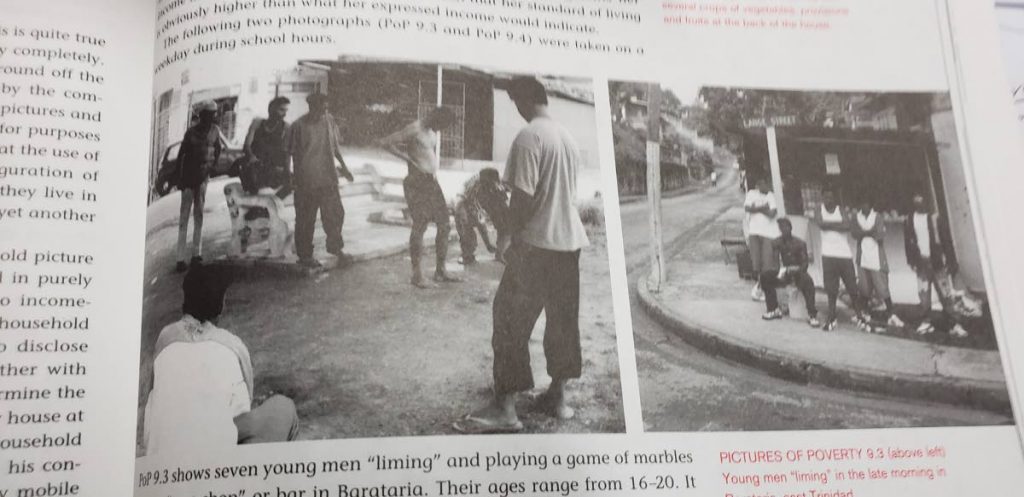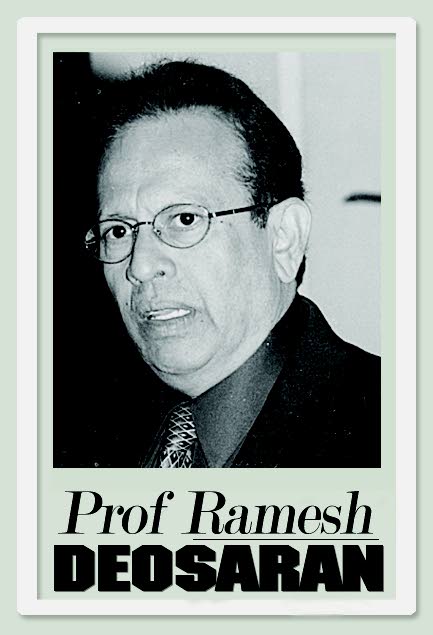Young zombies

Prof Ramesh Deosaran
Zombies. This is described as “a dull or apathetic person,” “apathetic” meaning “having or showing no emotion or interest,” (Concise Oxford). I remember for several days (mid-morning) in 2000 when doing country-wide research for a book, Psychonomics and Poverty (UWI Press, pp 284), I saw one group after another of young boys (14 to 18 years old) standing on corners, sitting on benches – many with folded arms just staring at passers-by (see eg pix above). From Moruga, Barataria, Morvant, Mayaro, Diego Martin, Point Fortin, Moriah, etc.
They looked dull and apathetic, zombie-like. They seemed to have no interest in life, other than what they were doing – idling, with temptation just around the corner. You still see this type around, even in prison. Our research team found these were generally school-dropouts or with “one or two passes” from government secondary schools, unemployed and deserving help. We made fifty actionable recommendations – all remaining idle too.
Then Catholic Archbishop Joseph Harris who, in last days in office, repeated his pleading: “The big problem of crime we have is the problem of education. We accept an education system which is not doing what it is supposed to do,” (Newsday, October 19, 2017). Before that, and confirming research, he complained: “Many teenagers abandon school because they have no interest in it…. And begin a life of petty crime then more serious offences,” (Guardian, July 1, 2016).
Apparently fed up, he said he was retiring to a life of spiritual reflection. How many are now doing that, having tried their best. They do so for the public interest but, like some others, also for their own civic conscience, only to discover the patient refuses the medicine. Seven things here:
1. Glamourously celebrating “the first hundred” does have its value. But this SEA system is not an athletic race, or beauty contest. The SEA carries very serious life-time sociological, psychological and even economic consequences. That is, while you publicly celebrate the grammar-type 100 for the grammar-type schools, thousands are left behind publicly stigmatised, distressed and silently labelled as failures. We console them, saying that whichever secondary school they enter, they could still “succeed.” Some courageously do, but…
2. Last year, a front page picture (Express) showed former president Anthony Carmona asking a group of secondary school students, “Who would like to be doctors?” Not plumbers, underwater welders, carpenters, etc, thus validating a powerful public preference.
3. Then up came the thoughtful Minister in the Education Ministry, Dr Lovell Francis. Referring to the “value” of technical/vocational education, he said “There is dignity in doing something with your hands. We can’t pretend that one side of the education spectrum, which is oversaturated, is the only thing and the tech/voc side is just an afterthought.” He argued that technical/vocation education is “not second class … or less important than grammar school education,” (Express, June 16, 2018).
4. Our research shows that almost 80 per cent of Form One students (denominational and government) held grammar-type university aspirations. By class and ethnicity, high proportions will not make it. We concluded: “The policy thrust towards technical and vocational education as a means of responding to multiple intelligence and varying aptitudes does have a place, but such policy and practice clash worryingly with the wildly-celebrated preference for university education and the consequential occupational benefits,” (R Deosaran. Inequality, Crime and Education. Ian Randle, 2016, pp 372 with 14 recommendations).
5. Some relief could be had if the “prestige schools” were randomly distributed across the country, with zoned allocations.
6. Anyhow, the Concordat-driven education system remains stubbornly caught between the challenge for educational equity and the irreversible public preference for grammar-type education. It is a cultural war, with many zombie-like failures.
7. Three and four-year old children are pressed into prestige-type kindergarten, deprived of natural playtime and the self-discovery that educational philosophers Dewey and Pestalozzi advocated. And soon after, necessarily pressed into “private lessons” for the “great race.” No wonder many who get into “prestige schools” end up with mental collapse, with little or no further interest in schooling – like traumatised zombies. The celebrated few mask the stigmatised many.


Comments
"Young zombies"